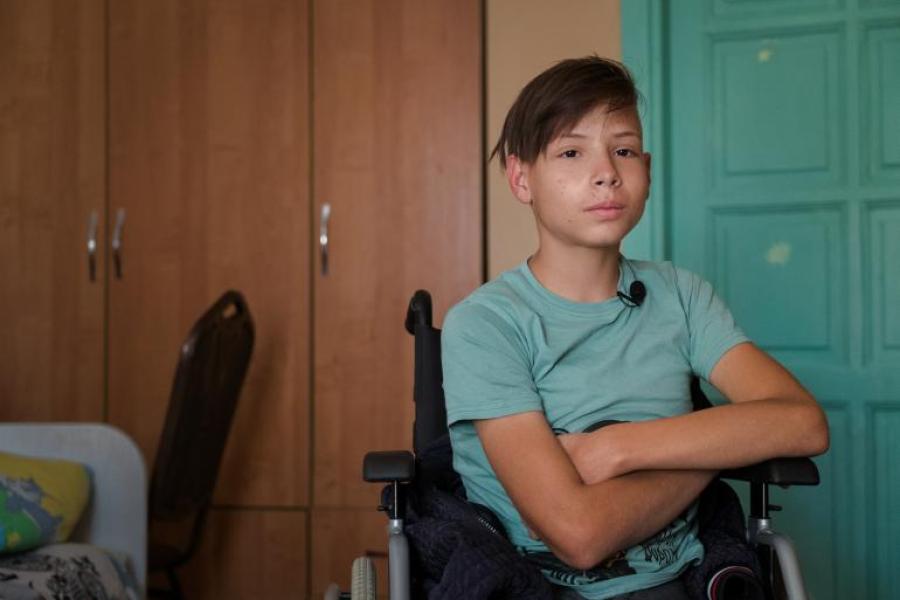UNICEF and Dinara Saduakassova launch a new charity campaign in Kazakhstan
23 January 2023
Now everyone in Kazakhstan can contribute to the Family for Every Child charity campaign

The United Nations Children's Fund (UNICEF) in Kazakhstan, together with UNICEF Goodwill Ambassador Dinara Saduakassova, launched the Family for Every Child fundraising campaign.
Under the campaign, every citizen of Kazakhstan will be able to contribute and help the most vulnerable children who may or have already been left without parental care and warmth. The aim of the campaign is to reduce the flow of children into institutions, to provide a quality family upbringing for every child, and to provide families with the necessary social services and support.
"The main priority of UNICEF in this good cause is to protect the right of every child to grow up in a caring family environment. I sincerely hope that your donations will contribute to this common cause for every child in Kazakhstan," said Arthur van Diesen, UNICEF Representative in Kazakhstan.
Dinara Saduakasova made a video address to the people of Kazakhstan, and noted that a child's happiest memories are connected with his or her family. It is in the family that the child feels safe. She underlined that the child, living separately from his or her parents and family faces the most severe trauma in his or her life, with long-term negative consequences. Dinara called on all caring Kazakhstani people to support the "Family for Every Child" campaign and make their contributions by link.
The right of every child to grow up in a family is guaranteed by the UN Convention on the Rights of the Child, ratified by the Government of Kazakhstan in 1994. Unfortunately, each year up to 2,000 children in Kazakhstan for various reasons end up in orphanages. The most important task of UNICEF in Kazakhstan is to reduce the flow of children into such institutions and to provide each child with a quality family upbringing. It is extremely important to eliminate the reasons for the separation of children from their parents through family support programs by ensuring comprehensive protection of the civil, economic, social and cultural rights of children without any discrimination.
If the child could not be kept in the family with the birth parents, and when immediate family members are unable to care for the child, every effort must be made to provide family care by involving more distant relatives, or if this is not possible, in a family substitute setting. In order to prevent the placement of children in residential institutions, it is important to provide the necessary legal framework for the further development of the institution of professional foster families in Kazakhstan. At the same time the focus should remain on the child's birth family. Even if a child is placed in an orphanage or a professional foster family, work must be done to restore the rights of the blood relatives.
UNICEF's long-standing experience in this area around the world shows that it is possible through the development of parenting skills programs, providing universal coverage of families with children with medical and educational services, as well as accessible, safe, inclusive and fair social protection focused on the well-being of children. Currently, the Government of Kazakhstan, civil society and UNICEF together have achieved the following results for children and families in Kazakhstan:
- Development of social work and special social services for families in difficult situations so that they receive the necessary assistance in a timely manner, as well as work to support parents to prevent separation from their children.
- Transformation of orphanages into support centers for children in difficult life situations and an increase in the number of such centers from three to 18 in the last five years. UNICEF continues to support the authorized agencies so that in the future these centers will provide comprehensive support to children and families, providing psychological, legal, social counseling and other support.
- Expert support to child care institutions of different types throughout Kazakhstan, including transfer of technical knowledge and best practices from other countries, documentation of regional experiences of child support centers in the country, and development of manuals and guidelines for the transformation of these institutions.
The money raised through the "Family for Every Child" campaign will enable the continuation of comprehensive work to achieve the best results for every child in Kazakhstan. UNICEF's work is financed entirely through the voluntary support of millions of people around the world and our partners in government, civil society, and the private sector. That is why UNICEF pays special attention to the issue of transparency about sources of funding and to how and for what campaign’s resources are spent. As a member of the International Aid Transparency Initiative (IATI), UNICEF provides open and comprehensive public access to operational and program data through its Transparency Portal.
UNICEF's "Family for Every Child" program in Kazakhstan helps to prevent the separation of children from their parents and, if a child is placed in an institution, helps to reestablish contact with the biological parents and supports the provision of quality social, medical and educational services to Kazakhstani families. The main focus of the campaign is to prevent the placement of children in residential institutions and to prioritize family-based child care. Support the campaign and help children get what they need to reach their full potential, developing in a supportive family environment. Even a small monetary contribution, can improve the life of a child in need. Make a donation now on the website using this link.



